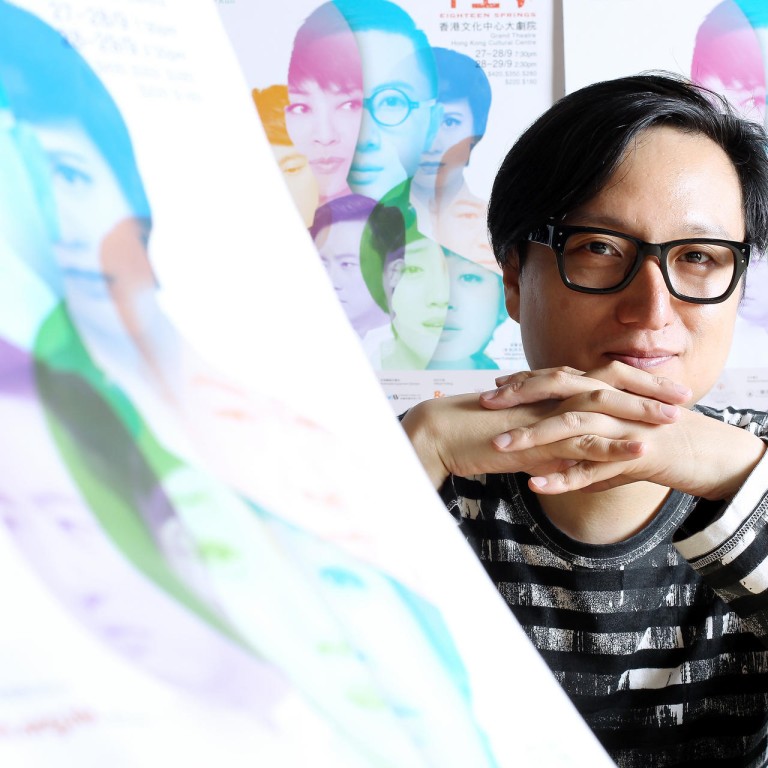
Holistic approach
Music director Yu Yat-yiu traces the roundabout route of his collaboration with Zuni Icosahedron
Music director Yu Yat-yiu hadn't heard Elaine Jin Yan-ling sing until he sat in a recording studio with the Taiwanese actress almost two years ago. Hearing her the first time, he was inspired to write three songs.
"Her voice is precious. People don't sing that way any more. She's classic and has a kind of atmosphere around her voice which is deep with emotions. It's very old school," Yu says.
The story happened almost a century ago, but the way people handle love, marriage and relationships is still the same
Jin hadn't sung on stage since the 1970s and few people remembered she could sing, but those at Zuni Icosahedron hadn't forgotten. The avant garde theatre group invited her to star in , a production based on the Eileen Chang Ai-ling novel. Jin only realised singing was on the agenda after she had accepted. It came as a shock.
"She panicked. Of course, we comforted her and I went to our studio with her", a rare treat for Yu. "Most of the time we don't have the luxury of getting to know the singer first and to get to have a session with her to try different ranges and styles to see what fits her best."
Jin sings all 10 songs in - the three Yu wrote for her as well as seven Chinese and western oldies, which he tinkered with to fit the performance. For the Herman Hupfeld classic - best known for its inclusion in - he changed the instrumentation but tried to keep the spirit of the piece, while he changed others more drastically.
Chang's novel, a heart-wrenching tale of tragedy and ill-fated romance set in 1930s Shanghai, is a much-loved story and its popularity added to Yu's pressure to do a good job.
"The story happened almost a century ago, but the way people handle love, marriage and relationships is still the same. It's all related to families, money and social status that overwhelm the actual love, but not many people read it that way, they just read it as a romantic story," he says.
plays at the Cultural Centre at the end of this month, its third run after playing sell-out shows there last September and a run in Singapore in February.
When director Mathias Woo Yan-wai first approached him about the project, saying he wanted a work that was heavy on the music, Yu was concerned there were too many elements in the story - "Shanghai at that period of time, the Chinese love story, the westernisation of Chinese people and the core of the Chinese traditional values" - but says clear stage directions helped him refine the options.
"Mathias suggested putting in three segments of Suzhou - it's a traditional kind of storytelling, partly sung, partly recited, by two people - and they come at very critical, intense moments in the storyline," says Yu.
The and Jin's singing account for more than a third of the performance and throughout the rest is Bach piano music, playing in the background.
Yu has worked on projects with Woo for almost 20 years and says the experience of collaborating with such a dynamic theatre group has shaped his creative approach. A year after graduating from the Chinese University with a degree in geography he was working at a TV station when he was introduced to Zuni. Everything took off from there.
"Zuni explores the stage as the most basic thing in the theatre. They really pay tribute to the stage rather than the play and that was inspiring for me. I'd worked on many stage productions, but never thought of it that way. I focused on the work rather than the space and the stage. And I never thought to focus on the relationship between the performers and the audience or the lighting or sound," says Yu.
He's taken this creative mindset to his other projects, working with pop singers and penning books. Most musical directors working with pop artists focus on the singer's voice, but Yu says it's important to consider them as people, to look at their influence and how the public sees them.
His writing has taken a front seat over the past two years with a couple of book projects, the first of which will be out early next month. It will focus on 11 Hong Kong musicians and composers working across the spectrum from pop to classical, and will explore their views on creativity and how the local music scene has changed since the 1980s.
All this with a degree in geography? "I'm a practical person," says Yu, explaining his choice of subject. Yet music has always been important to him. He began studying the piano aged five and played a number of Chinese instruments as well as sang in a choir. His memories of his six years at the Diocesan Boys' School all involve music.
"Secondary school was crazy. I skipped a lot of classes, and went to orchestra rehearsal and choir rehearsal every day. That school is more like a music institution than a secondary school," he says.
Some of his schoolmates practised hard and prepared to take the next step - study music at university - but he drew the line at that: "I didn't want to study it. I didn't want to hate it in the end."
Also unusually for a music director, he rarely listens to music for pleasure, unless it's classical. "Whenever I listen to music it's like work to me, so the only music I listen to is classical because I have a distance with that. I just listen."
Eighteen Springs,

